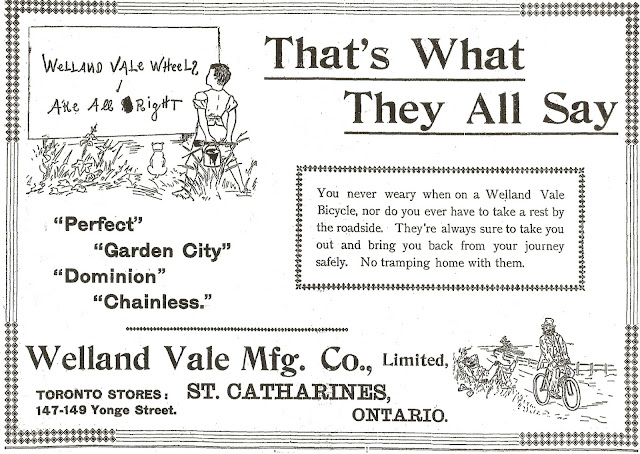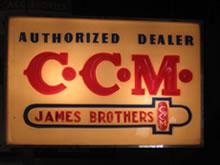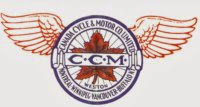Welland Vale and the Co-operative Cycle & Motor Co.


When the Welland Vale Manufacturing Co. of St. Catharines opened a Toronto retail outlet in February 1898, it laid claim to being the largest sporting goods store in the city, handling everything from ice skates to tennis racquets. At the time it was reported that the company had “left no stone unturned to make their premises at 149 Yonge Street a place worthy of the bicycles they sell.” (Toronto Star 02/04/1899)

Established in 1874 by William J. Chaplin the Welland Vale Manufacturing Co. produced a variety of steel goods, including axes, saws and harvesting tools. By 1896, however, the bulk of their factory had been given over to the production of a successful line of bicycles, that included the Perfect, Garden City and Dominion lines, as well as a popular chainless model. In 1899 when the Welland Vale bicycle works became part of the CCM merger, the St. Catharine's operation proved to be CCM's busiest factory.

Then on May 16, 1900, a serious fire ravaged the St. Catharines factory bringing an abrupt end to its manufacture of bicycles. Described as “the most disastrous conflagration” that had occurred in the history of the city, the fire destroyed the large building occupied by CCM, as well as the remaining shops of the Welland Vale Manufacturing Co., causing half a million dollars damage and putting five hundred employees out of work.

Following the fire CCM announced that it would not rebuild in St. Catharines, but had instead agreed to a deal with the city of Brantford to move the Welland Vale bicycle works to that city. In return CCM was to receive from the city of Brantford a seven year extension on the company's tax exempt status in that city.
“Mr. Joseph Shenstone, General Manager of the Canada Cycle & Motor Company, Toronto, has been here [Brantford] and the deal has been completed. The full details of the scheme are not yet allowed to transpire, but all the wheels and tools hitherto made at the Welland Vale factory will be made at the Brantford factory. Mr. Shenstone had a conference with the Manufacturers’’ Committee of the City Council, and an arrangement was agreed upon to have the manufacture of the chainless wheel take place in the Brantford factory.” (Globe May 30, 1900).
It was a move that didn’t sit well with folks in St. Catharines who found themselves without their bicycle works. In an effort to appease the disgruntled, when the St. Catharines Board of Trade announced that the Welland Vale Manufacturing Co. and Chaplin Saw Works intended to rebuild and to take on more employees than before the fire, it also announced that the Co-Operative Cycle & Motor Co. from Brantford and Ingersoll had commenced business in St. Catharines and "compensates the city for the loss of the Welland Vale bicycle works.” (Annual Report of the St. Catharines Board of Trade for 1900).

Photo courtesy: Gerald Hobbis
Incorporated in November 1900, the Co-Operative Cycle & Motor Co. had been formed for the purpose of acquiring the plant, machinery, stock-in-trade, business and good-will of the McBurney-Beattie Co. of Toronto and the W. G. Nott Bicycle Co. of Brantford. Among the directors of the newly-formed company were Jas. Coulter of Ingersoll and Chas. F. Verity of Brantford. W.G. Nott was the president and manager of the operation, while J. McBurney of Toronto was its vice president.

The company purchased land in St. Catharines and erected a large three storey factory where they turned out "wheels" as rapidly as machinery, skill and labour allowed.They continued to make the E. Z. bicycles, formerly made by the W. G. Nott Bicycle Co., as well as the McBurney-Beattie bicycle and opened up branch retails outlets in Kingston, Toronto, Hamilton and London.

There’s little question that the Co-operative Cycle & Motor Co. had hoped to cash in on the similarity of its company name to that of the Canada Cycle & Motor Co., not to mention the CCM acronym, but, in the end, it wasn't enough. Although expectations ran high in St. Catharines regarding the company, unfortunately within a few years Co-operative Cycle & Motor Co. found itself in financial difficulties and had to shut down.
Meanwhile to the east in Toronto the newly-formed CCM continued to produce bicycles under the old Welland Vale model designation of Perfect and did so well into the 1920s.



<?xml:namespace prefix = o />




